Business and Human Rights (142 found)
Losing Ground: Land Conflicts and Collective Action in Eastern Myanmar
Analysis of KHRG’s field information gathered between January 2011 and November 2012 in seven geographic research areas in eastern Myanmar indicates that natural resource extraction and development projects undertaken or facilitated by civil and military State authorities […]
• • •Developing Disparity: Regional Investment in Burma’s Borderlands
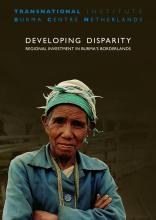 Unless foreign direct investment in Burma’s war-torn borderlands is refocused towards people-centered development, it is likely to deepen disparity between the region’s most neglected peoples and Burma’s new military, business and political elite and exacerbate a decades-long civil war.
Unless foreign direct investment in Burma’s war-torn borderlands is refocused towards people-centered development, it is likely to deepen disparity between the region’s most neglected peoples and Burma’s new military, business and political elite and exacerbate a decades-long civil war.
Burma has entered a pivotal stage in its political and economic development. The advent of a new quasi-civilian government has raised the prospect of fundamental reforms […]
Report of Evidence Regarding Controversies at Letpadaung Hill Copper Mine Project
Executive Summary This report was prepared by Lawyers Network, an independent association of leading lawyers throughout Myanmar, and Justice Trust, an international group that supports national efforts to advance rule of law and human rights. It concerns recent controversies at a Letpadaung copper mine, a joint venture between Wanbao Mining, a subsidiary of North China […]
• • •Danger Zone: Giant Chinese Industrial Zone Threatens Burma’s Arakan Coast
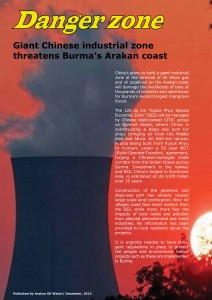 China’s plans to build a giant industrial zone at the terminal of its Shwe gas and oil pipelines on the Arakan coast will damage the livelihoods of tens of thousands of islanders and spell doom for Burma’s second largest mangrove forest. The 120 sq km “Kyauk Phyu Special Economic Zone” (SEZ) will be managed by Chinese state-owned CITIC group on Ramree island, where China is constructing a deep sea port for ships bringing oil from the Middle East and Africa […]
China’s plans to build a giant industrial zone at the terminal of its Shwe gas and oil pipelines on the Arakan coast will damage the livelihoods of tens of thousands of islanders and spell doom for Burma’s second largest mangrove forest. The 120 sq km “Kyauk Phyu Special Economic Zone” (SEZ) will be managed by Chinese state-owned CITIC group on Ramree island, where China is constructing a deep sea port for ships bringing oil from the Middle East and Africa […]
Excluded: Burma’s Ethnic Nationalities on the Margins of Development and Democracy
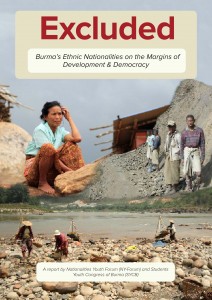 This report presents documented evidence that ethnic nationalities directly affected by development projects in Burma are systematically denied their right to free, prior, and informed consent (FPIC). While development related abuse has been well documented, no report has shed light on the staggering scale of the widespread denial of participation rights in Burma […]
This report presents documented evidence that ethnic nationalities directly affected by development projects in Burma are systematically denied their right to free, prior, and informed consent (FPIC). While development related abuse has been well documented, no report has shed light on the staggering scale of the widespread denial of participation rights in Burma […]
Lost Paradise: Damaging Impact of Mawchi Tin Mines in Burma’s Karenni State
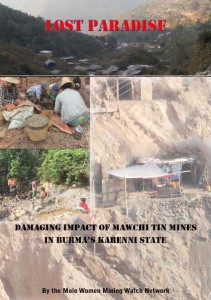 The Molo Women Mining Watch Network was formed by women from the Karenni Women’s Organization, Karenni Social Welfare and Development Centre and Karenni Evergreen Organization, who wanted to research information about the Mawchi tin mines. The network was named after the Molo Stream which flows from the Mawchi mines to the Salween River. It aims to work for women throughout our state who are facing social and environmental impacts of mining, and to empower them to solve these problems […]
The Molo Women Mining Watch Network was formed by women from the Karenni Women’s Organization, Karenni Social Welfare and Development Centre and Karenni Evergreen Organization, who wanted to research information about the Mawchi tin mines. The network was named after the Molo Stream which flows from the Mawchi mines to the Salween River. It aims to work for women throughout our state who are facing social and environmental impacts of mining, and to empower them to solve these problems […]
Pipeline Nightmare
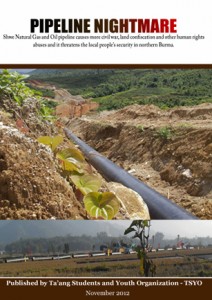 Shwe Pipeline Brings Land Confiscation, Militarization and Human Rights Violations to the Ta’ang People
Shwe Pipeline Brings Land Confiscation, Militarization and Human Rights Violations to the Ta’ang People
This report illustrates how the Shwe Gas and Oil Pipeline project, which will transport oil and gas across Burma to China, has resulted in the confiscation of people’s lands, forced labor, and increased military presence along the pipeline, affecting thousands of people […]
• • •Catalyst for Conflict
Foreign investments are causing increasing conflict and abuses in northern Burma despite recent ceasefire agreements and talk of reform in the country, according to a briefing paper released by the Ta’ang Students and Youth Organization […]
• • •Grab for White Gold: Platinum Mining in Eastern Shan State
Since 2007, destructive platinum mining has been taking place in the hills north of Tachilek, eastern Shan State, impacting about 2,000 people from eight Lahu, Akha and Shan villages. The platinum is being extracted by Burmese mining companies […]
• • •Not Open for Business: Despite Elections, Investor Risk Remains High in Burma
The April 1 Burmese by-elections are being heralded as a great success both for the people of Burma and for the international community after more than a decade of sanctions. While there is cause to celebrate in the wake of initial reforms by President Thein Sein and the electoral victory of Nobel Laureate Aung San Suu Kyi, high levels of risk for investors – and the people of Burma – remain […]
• • •
 All posts
All posts